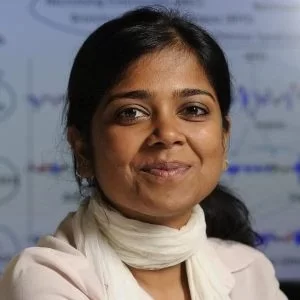- Thursday, May 01, 2025

By: Vibhuti Pathak
In a groundbreaking advancement in healthcare technology, Indian American scientist Suchi Saria has led the development of an artificial intelligence-powered platform that is saving thousands of lives by detecting sepsis early in hospital settings. Her innovation, known as TREWS (Targeted Real-Time Early Warning System), is reducing sepsis mortality rates by 18 per cent in dozens of US hospitals — a significant breakthrough against a condition that claims around 270,000 American lives annually.
Suchi Saria, a leading figure in the world of health tech and artificial intelligence, is an associate professor at Johns Hopkins University. Her academic roles span computer science, biostatistics, health system informatics, and health policy. But it is her deeply personal experience — the tragic loss of her nephew to sepsis in 2017 — that became the emotional drive behind this life-saving invention.
Sepsis, often dubbed a “silent killer,” is an immune system overreaction that can quickly spiral into fatality if not caught in time. Its symptoms — including fever, confusion, and shortness of breath — mimic several other ailments, making early detection particularly challenging. With TREWS, however, hospitals have found a way to diagnose cases nearly two hours earlier than traditional methods, significantly improving patient survival chances.
“Sepsis isn’t easy to spot, especially in already overwhelmed clinical environments,” says Saria. “With TREWS, we’ve created a tool that works with clinicians, not around them — streamlining data from medical records, lab results, vitals, and even physicians’ notes to generate accurate, real-time alerts.”
Since its deployment in 2023, the AI tool has proven transformative. According to a study published in Nature Medicine, TREWS has reduced average hospital stays by half a day and ICU usage by 10 per cent, showing measurable impact on both patient care and hospital resources. Notably, the platform boasts a 90 per cent adoption rate — rare for new tech in clinical environments — thanks to its seamless integration into existing workflows.
Saria’s journey from academic research to industry impact has been supported by significant public investment. She credits the National Science Foundation’s Future of Work at the Human-Technology Frontier program for allowing her to pursue long-term research that prioritizes human outcomes. This support eventually helped her launch Bayesian Health, a startup that has scaled TREWS across academic, community, and regional hospitals, expanding its reach by over 800 per cent in the past year.
Now a recognized voice in AI and healthcare, Saria has been featured in outlets such as TIME, Popular Science, and Modern Healthcare. Her work stands at the intersection of advanced technology and compassionate care — a blend of engineering precision and human-centered design.
“Continued investment in such forward-looking health tech is vital,” she emphasizes. “It’s the only way to ensure that our systems evolve with the growing complexity of patients, staff shortages, and resource limits.”
As the founding research director of the Malone Center for Engineering in Healthcare and a core member of the Data Science and AI Institute, Saria has consistently led efforts to personalize and improve patient care using “messy” real-world data.
Her algorithms are already saving lives in hospitals across the U.S., and her pioneering work has earned accolades from Business Insider, MIT Technology Review, Popular Science, and the World Economic Forum. Notably, Saria’s AI-driven Parkinson’s tracking app and her breakthrough in “weak supervision” techniques show her broader commitment to using data science to tackle complex medical challenges—at scale and with empathy.
Saria, who earned her Ph.D. from Stanford University under Daphne Koller, joined Johns Hopkins in 2012 and has since become a nationally recognized figure, with honors including a Sloan Research Fellowship, NSF Computing Innovation Fellowship, and selection by IEEE Intelligent Systems’ AI’s “10 to Watch.” Her contributions were even presented to the U.S. Congress by the NSF in 2017.
As an Indian American changemaker, Saria’s efforts not only embody scientific excellence but also highlight the vital role the Indian diaspora plays in global innovation. Her journey from India to Johns Hopkins is more than personal; it’s a story of vision, perseverance, and the power of purpose-driven technology.